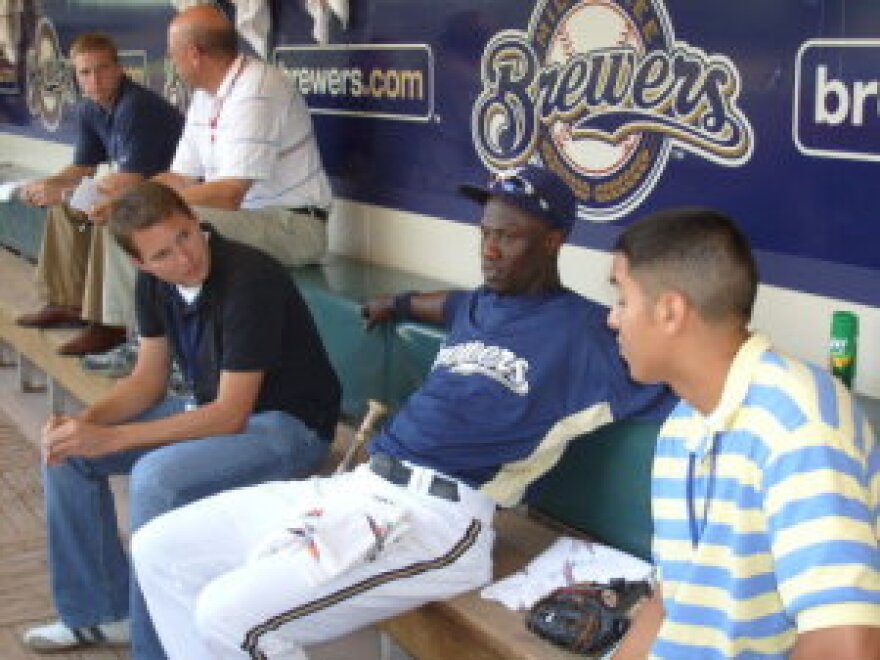The Milwaukee Brewers have one of the best records in baseball this season and could make the playoffs for the first time in a quarter-century. What also makes the team noteworthy is that it has more African American players than most other teams. While Major League Baseball has spent $20 million trying to keep the sport alive in inner cities -- and likes to recall the days of Jackie Robinson breaking the color barrier -- interest among black children seems to have dwindled. But WUWM’s Erin Toner found players and supporters in Milwaukee working to reverse the trend.
At Carver Park on Milwaukee’s north side, four-, five-, and six-year-olds are playing T-ball, and for the most part, it’s complete chaos. It can also be hilarious. At one point, a kid on first base gets ready to run to second by crouching down on all fours.
The vast majority of kids who play here in the Beckum-Stapleton Little League are black, but any child can join. James Beckum started the league in 1964 with just four teams. It grew to 31, but in recent times has shrunk. Beckum says kids’ interests have changed.
“Well, because there’s a lot of other programs, like basketball, soccer, football that got to be pretty big and they got different love for different things, so,” Beckum says.
When I returned to Carver Park on a different night, I saw what Beckum meant. There weren’t any kids on the ball fields, but I did find some boys playing football. Most told me they don’t care for baseball.
“Oh, that’s kind of boring,” says 14-year-old Frederick. “It take too long. And every time somebody get a hit it’s always caught. No point in watching it cause you already know what’s going to happen,” Frederick says.
Eleven-year-old Jaylen says he played baseball for about four days.
“It kind of got boring after four days. I’m horrible at baseball. I can’t get a hit, I can’t catch, can’t make a home run,” Jaylen says.
“I’d get up at 7, play baseball all day long if I could and you don’t see that today. Just drive around, look at baseball fields, they’re empty,” says Eddie Bedford, who teaches Negro League history at Eastern Michigan University.
He was in Milwaukee recently for the dedication of a historical marker honoring the Milwaukee Bears, a Negro League team that played here in 1923. Bedford says baseball fields in central cities are empty for several reasons. Yes, some kids find baseball boring. He also says the sport can be expensive. Families have to buy such things as special shoes, mitts, bats and balls…and in urban communities, there are fewer resources to maintain ball fields and run leagues. And, Bedford says, baseball’s usually a game you learn to play with your dad.
“In the African American community, you’re looking at the number of single-parent homes and moms aren’t playing baseball. So you’re looking at economics and I just kind of think generally a lack of interest because now when you’re looking at baseball, there aren’t many players out there that look like the black kids today playing,” Bedford says.

In fact, just 8 percent of current Major League Baseball players are black. That’s the lowest rate in at least 20 years. In Milwaukee, though, it’s a different story. The Brewers have seven active black players, one of the highest percentages in the league.
General Manager Doug Melvin says the team’s worked to build diversity through the draft and the minor leagues.
“It’s very important for our game to attract the African American player cause they’ve been such a huge part of the history of the game. We will take it upon ourselves in Milwaukee to continue that,” Melvin says.
Several Brewers have just finished batting practice and are in the dugout dabbing their sweaty foreheads. Outfielder Mike Cameron says he hopes the team’s success could inspire more kids to play baseball.
“You know we’re on ESPN all the time, we have a guy at every different position. There are a lot of kids that still watch the game, a lot of kids that are in the minor leagues that kind of look up to us and, and I think that’s one of the beauties that we have here in Milwaukee,” Cameron says.
One reason pitcher CC Sabathia says he wanted to come to Milwaukee is because the team has so many black players. And he devotes some of his time in the off season to working at camps and leagues to encourage inner-city kids to take an interest in the game.
“We take it upon ourselves to get in our communities and just try to be visible and let the kids see that this is a sport that we can play,” Sabathia says.
The Brewers have helped support James Beckum’s Little League over the years, and players sometimes come out to meet the kids. Though, Beckum says, not as often as in the past. He says it’s sad to see baseball fall out of favor among African Americans, because of what it took to break the color barrier in the first place.
“I would like to see more kids out cause I think they missing a great opportunity. I think if they come out and play this game and learn this game, it could be beneficial to them down the road,” Beckum says.
Because baseball, says Beckum, is a great way for kids to learn life lessons, have a good attitude and keep going when you make mistakes.


